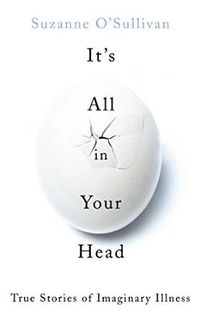Suzanne O'Sullivan
Doctor Suzanne O'Sullivan is a British neurologist and author.
Book - It's All In Your Head[edit | edit source]

Doctor Sullivan published her book, It's All In Your Head, in 2015. It is a book about medically unexplained symptoms and psychosomatic illness and includes a chapter on ME/CFS despite widespread agreement that it is not a psychosomatic illness.
Criticism[edit | edit source]
The ME Association published a letter by Lady Countess of Mar.[1] The association also wrote its own letter of complaint to the British Times newspaper in response to its review of the book that incorrectly referred to ME/CFS as a psychosomatic illness.[2]
British charity Invest in ME also criticized the book which they describe as "stigmatising".[3]
British charity Action for ME also wrote to the Times to criticise coverage of the book.[4]
Professor James Coyne has written critically of the book describing it as a "dreadful book".[5][6]
Patient and author Nasim Marie Jafry has criticised the book, accusing it of "recycling nonsense".[7]
Geoffrey Jones published a blog referring to the book author's "ignorant meanderings about ME".[8]
Wellcome Book Prize[edit | edit source]
In April 2016 the book was awarded the 2016 Wellcome Book Prize, and the author a £30,000 prize (around US $45,000).[9]
Notable studies[edit | edit source]
Doctor Sullivan has published no studies on ME/CFS.
Clinic location[edit | edit source]
The Royal London Hospital, London, United Kingdom.
Articles[edit | edit source]
- 16 May 2015, 'You think I'm mad?' – the truth about psychosomatic illness The Guardian by Suzanne O'Sullivan
Talks and interviews[edit | edit source]
Suzanne O'Sullivan is quoted in a PVFS article in ELLE Magazine Mind Games[10]
Online presence[edit | edit source]
Learn more[edit | edit source]
- University College London Hospitals - Dr Suzanne O'Sullivan
- Amazon.co.uk - It's All In Your Head
- Amazon.com - It's All In Your Head
- GoodReads - It's All In Your Head
See also[edit | edit source]
References[edit | edit source]
- ↑ ‘It’s All in Your Head’ psychosomatic book storm | Countess of Mar challenges author to change her mind about ME/CFS]
- ↑ Failure to keep up with the research on ME/CFS is ‘inexcusable’
- ↑ INVEST IN ME Letter to The TIMES on David Aaronovitch Book review “It’s All in Your Head: True Stories of Imaginary Illness by Suzanne O’Sullivan 6th June 2015
- ↑ Letter to The Times
- ↑ Guest blog reviewing Suzanne O’Sullivan’s It’s All in Your Head With an Introduction
- ↑ Experts weigh in on Suzanne O’Sullivan’s commentary on imaginary illness in The Lancet
- ↑ Wellcome Book Prize 2016 - ignorance rewarding ignorance
- ↑ Proud to be Ignorant?
- ↑ Suzanne O'Sullivan's It's All in Your Head wins Wellcome Book Prize 2016
- ↑ Mind Games - ELLE Magazine September 2016 - Phoenix Rising - ELLE Anecdotes used to promote O'Sullivan, complain she's being trolled

